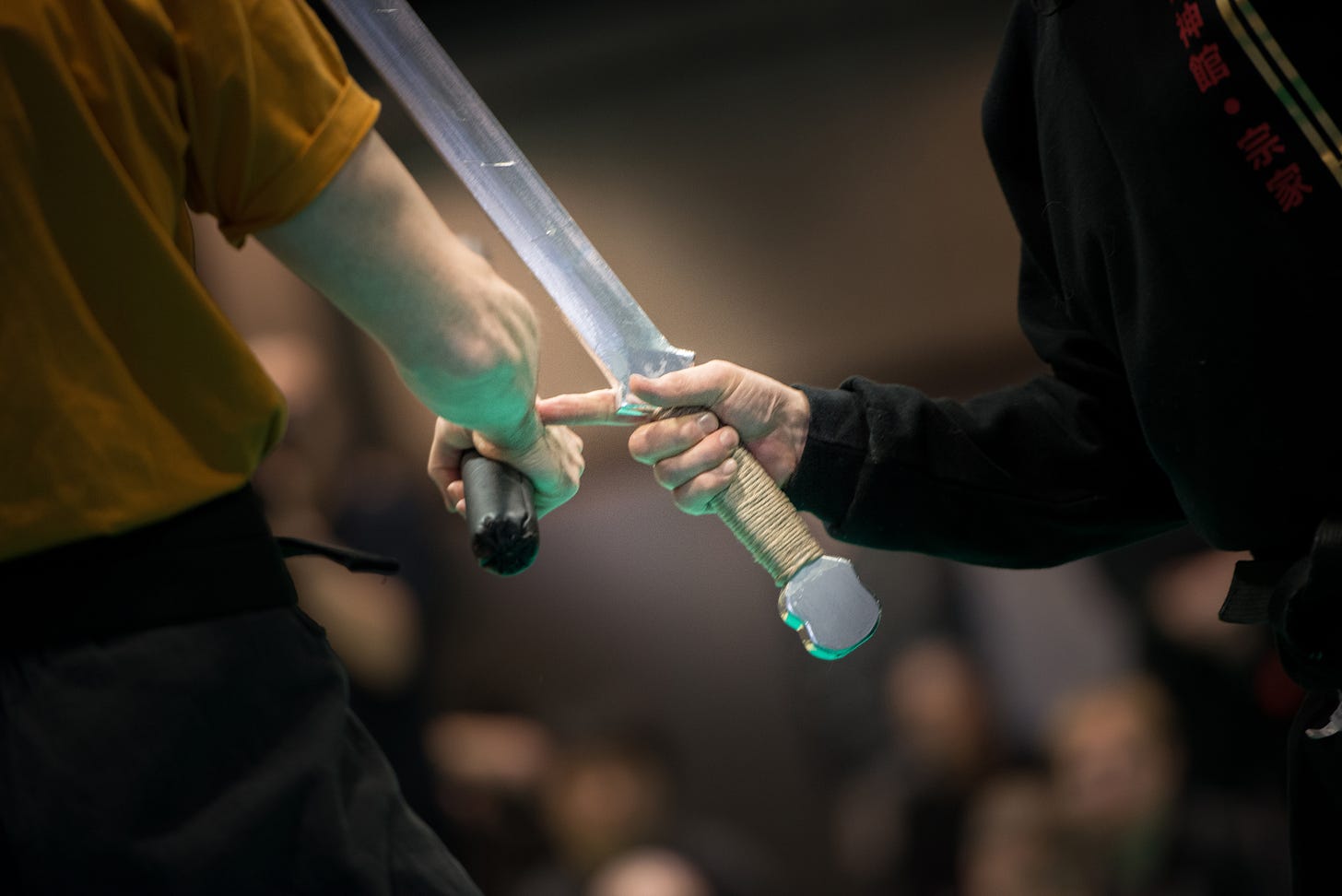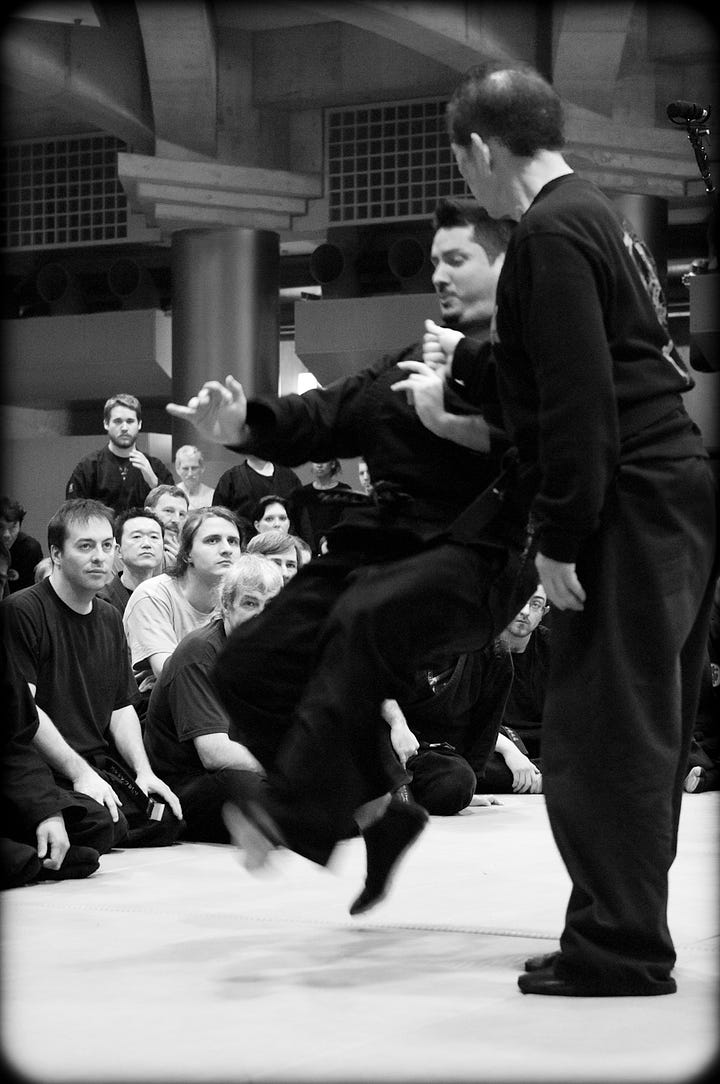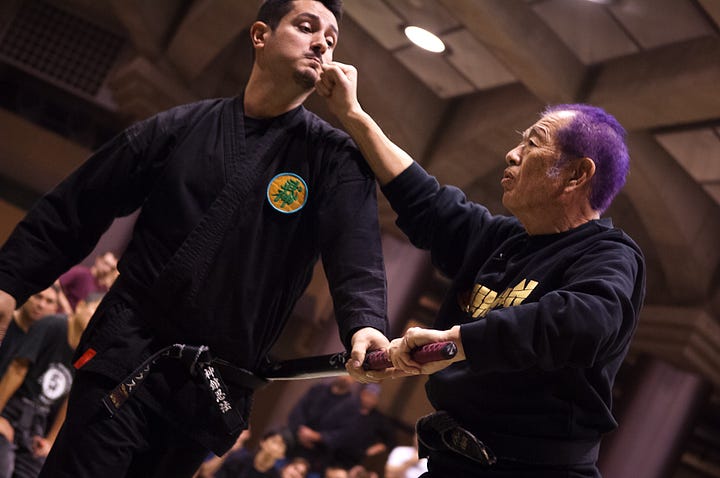Gokui no Uta by Grandmaster Toda Shinryuken
There must be neither strength nor weakness, neither hardness nor rigidity ...

This Gokui no Uta by the grandmaster Toda Shinryuken (grandfather and teacher of Toshitsugu Takamatsu) contains profound teachings on the nature of inner balance, detachment and the understanding of ‘emptiness’ or ‘emptiness’ in martial and spiritual practice. Each sentence contains a key concept that invites the practitioner to reflect on his or her physical and mental state on the path of martial arts.
強弱柔剛あるべからず、(Kyoujaku juugou aru bekarazu)
故に此の心を離れ、(Yue ni kono kokoro o hanare)
空の一字を悟り、(Kū no ichi ji o satori)
体又無しとして、之に配す. (Tai mata nashi to shite, kore ni haisu)
戸田真龍軒 (Toda Shinryuken)
1. 強弱柔剛あるべからず
"There should be neither strength nor weakness, neither softness nor hardness."
This phrase, 強弱柔剛あるべからず (Kyoujaku jyuu gou aru bekarazu), emphasizes that there should be no attachment to strength or weakness, softness or hardness in the mind of the practitioner. 柔 (jyuu), meaning "softness" or "flexibility," Toda Shinryuken suggests the importance of releasing any attachment to extreme or absolute qualities. Here, "strength" (強) and "weakness" (弱), along with "softness" (柔) and "hardness" (剛), represent dualities that, if rigidly held, limit adaptability. True mastery lies in a fluid neutrality, allowing the practitioner to respond freely to each situation without being confined to a single quality. This approach fosters a mindset where the warrior, unbound by fixed identity, can adapt to the demands of the moment, without being defined by hardness or softness, strength or weakness.
2. 故に此の心を離れ
“Therefore, let go of this state of mind”.
The word ‘yue ni’ (故に) means ‘therefore,’ and ‘kono kokoro’ (此の心) translates as ‘this heart’ or ‘this mind’ in reference to the practitioner's state of mind. ‘Hanare’ (離れ) means “to let go” or ’to detach.’ This phrase tells us that once we understand that true essence does not lie in strength or weakness, the next step is to abandon that mindset. It reminds us that attachment to a fixed state, whether physical or emotional, prevents the development of the practitioner in a deeper sense.
3. 空の一字を悟り
“Understand the character of ‘emptiness’ (空)”.
Here an essential concept in Japanese philosophy and Zen Buddhism is introduced: ‘kū’ (空) or ‘emptiness.’ The character ‘ichi ji’ (一字) means ‘one word’ or ‘one character.’ ‘Satori’ (悟り) refers to “understanding” or ’enlightenment.’ This phrase urges the practitioner to understand the true meaning of emptiness, not just as an idea or concept, but as an inner, spiritual realisation. In the context of Budo, understanding emptiness implies accepting impermanence, the lack of a fixed self and the ability to adapt to the natural flow of circumstances without imposing a rigid way of thinking or acting.
4. 体又無しとして、之に配す
“Consider that the body also does not exist and harmonize with this”.
“Tai” (体) means “body,” while “mata nashi” (又無し) translates as “also does not exist” or ’there is none.’ ‘Kore ni haisu’ (之に配す) means ’to harmonize with this.’ In this phrase, Toda Shinryuken invites us to see the body as something that does not have an independent existence either. This is not a literal negation of the body, but an understanding that we should not identify exclusively with it, nor consider it as something separate from the mind or the ‘emptiness’ mentioned above. The idea is to merge mind and body into a single flexible and adaptable unit, aligned with the understanding of emptiness.
“ There should be neither strength nor weakness, neither hardness nor rigidity. Therefore, abandon this mentality, understand the essence of emptiness in one word, and, considering that the body does not exist as a separate thing, harmonise yourself with this principle. “


Together, this Gokui no Uta emphasises an ideal of detachment from dualities and fixed identities. By letting go of ideas of strength and weakness, and by achieving an understanding of emptiness, the practitioner is freed from inner limitations. Master Toda Shinryuken guides us to a state of neutrality, clarity and flexibility, where mind and body become one, in tune with the natural flow of life. This poem is a teaching on how to transcend physical and mental limits to achieve true harmony and freedom, essential principles in the practice of martial arts and in the pursuit of personal mastery.



